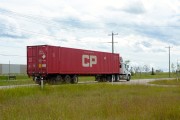To understand the challenge of tackling climate change in Canada, picture a 10-year old boy.
We'll call him "Johnny," but you can go with "Stephen" if you prefer.
Although he's a smart kid, Johnny gets into trouble for not starting his climate homework until the last second. Often he's too busy playing in the oilsands box to clean his room, so he hides everything under the bed and hopes no one notices. And while the big kids are headed for Clean Energy University, Johnny won't have a chance of getting in unless he improves his D grade in global warming. His parents are really starting to worry about his future.
Ready or not, it's time for Canada to have an adult conversation about tackling climate change.
 That's why we worked with the David Suzuki Foundation to produce a detailed report on the government policies needed to cut Canada's emissions. We hired a leading economic analysis firm — one that the federal and Alberta governments have used — to model what it means for Canada's economy.
That's why we worked with the David Suzuki Foundation to produce a detailed report on the government policies needed to cut Canada's emissions. We hired a leading economic analysis firm — one that the federal and Alberta governments have used — to model what it means for Canada's economy.
On balance, the results are good. We found that Canada can meet an ambitious target to cut its greenhouse gas pollution while continuing to enjoy solid economic growth. By 2020, Canada's GDP would be 23 per cent larger than in 2010, and we would create nearly two million net new jobs.
But there are some nuances. Canada's economic growth happens a bit more slowly than it would if we did nothing to tackle climate change. Instead of growing at 2.4 per cent each year, the economy would grow at 2.1 per cent annually if Canada adopted an ambitious, science-based emission reduction target.
The need to tackle high emissions from the oilsands and coal-fired electricity means that Alberta's feverish rates of expansion would cool. Even so, Alberta would continue to lead the nation in economic growth, increasing its GDP by 38 per cent by 2020 while creating over 130,000 net new jobs.
So tackling climate change won't be free, but it's certainly affordable. Our study also found that delay increases the costs of action. And although we didn't factor in the costs of global warming itself, international analysis consistently shows that the damage from unchecked climate change costs far more than addressing the problem.
We hoped the study would make a useful contribution to the policy debate in Canada. Instead, Environment Minister Jim Prentice greeted it with scorn, calling its conclusions "irresponsible" and "divisive."
Mr. Prentice manages climate policy for one of the world's top 10 per capita emitters of greenhouse gases, and Canada's weak policies have not yet improved under his watch. To us, what's truly irresponsible is spending nearly four years in office without putting in place policies that can substantially cut emissions.
In addition to the science-based emissions target for Canada, our study analyzed the effects of meeting the government's weaker target. We found that it's not cost-free either: Canada's overall GDP growth is 2.2 per cent annually (rather than 2.4 per cent under "business as usual" conditions). And it requires much tougher policies than anything Mr. Prentice has yet proposed. But he dismissed those findings too, calling them "overstated."
What's really behind the government's resistance to meaningful action on climate change?
One clue lies in Jim Prentice's very first speech as environment minister. In Lake Louise nearly a year ago, Mr. Prentice pledged that he would never "aggravate an already weakening economy in the name of environmental progress." In other words, he sees a zero-sum game of economy vs. environment, and economy always wins.
This runs counter to modern ideas of sustainable development and green growth, which are now part of mainstream business thinking. Moving to a cleaner economy presents a wealth of economic opportunities. As countries around the world act to cut emissions, the federal government's approach risks putting Canada at a serious disadvantage in the global race for clean energy jobs.
(Fortunately, not all Canadian governments take this approach. The day our study was published, newspapers also reported on an independent assessment of the economic impacts of Ontario's new Green Energy Act. It concluded that renewable power will produce $4.5 billion in economic gains in the province in the next two decades.)
Alberta's oilsands offer another explanation for the federal government's timidity. Under "business as usual" conditions, this sector would be responsible for 95 per cent of the projected growth in Canada's industrial greenhouse gas emissions by 2020. And because it's expensive to cut emissions in oilsands operations, they drive up the price that Canada would need to put on greenhouse gas pollution.
In our scenario, oilsands operations would continue to expand even while meeting an ambitious climate target, but it would happen more slowly, with firms investing in new technologies to control their emissions.
It's clear that Canada can be both green and prosperous. Science and economics both argue that we need stronger climate policies urgently. Now the politicians need to show that they're ready to step up to the plate.
Clare Demerse is the associate director of the Pembina Institute's climate change program. The Pembina Institute/David Suzuki Foundation study is entitled Climate Leadership, Economic Prosperity.





